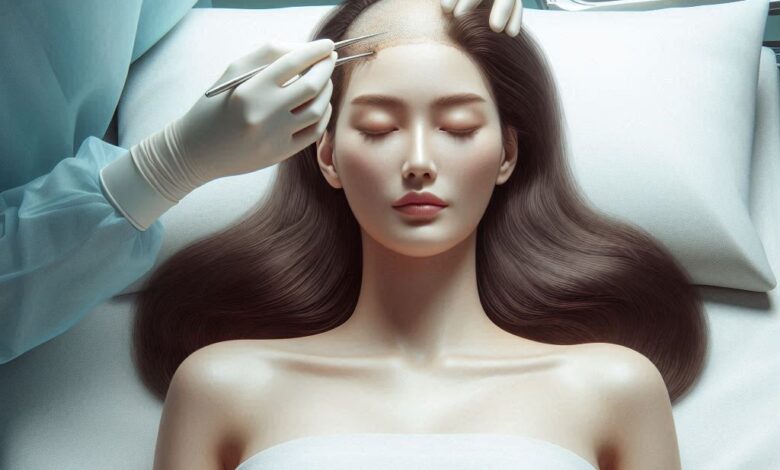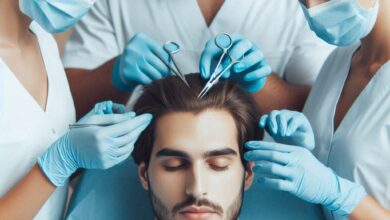Hair Transplant
Hair Transplant: Recovery Time & Precautions

The recovery time after a hair transplant surgery can vary depending on the individual’s healing process, the type of procedure (FUT or FUE), and the extent of the transplant. Here’s a general overview of what to expect and precautions to take during the recovery period:
Recovery Time
- First Few Days Post-Surgery:
- Immediate Post-Op Care: The scalp may be sensitive and swollen immediately after surgery. You may experience mild discomfort or pain, which can typically be managed with prescribed medications.
- Bandaging: The donor and recipient areas may be covered with bandages or dressings that are usually removed within a day or two.
- First Week:
- Scabbing and Crusting: Small scabs or crusts may form around the transplanted hair follicles and donor area. These are normal and should not be picked or scratched to avoid dislodging the grafts.
- Avoiding Activities: It’s important to avoid strenuous activities, heavy lifting, bending over, or activities that can increase blood pressure and strain the scalp.
- Two Weeks to One Month:
- Shedding of Transplanted Hair: It’s common for the transplanted hair to shed within the first two to three weeks. This is a normal part of the process, and new hair growth usually begins in the coming months.
- Gentle Washing: You can begin gently washing your scalp with a mild shampoo as directed by your surgeon to keep the scalp clean and promote healing.
- Returning to Normal Routine: Most patients can return to work and normal activities within a week or two, depending on individual recovery and the nature of their job.
- Long-Term Recovery:
- Hair Growth: New hair growth from the transplanted follicles typically begins around three to four months post-surgery.
- Full Results: It may take up to a year to see the full results of the hair transplant as the hair continues to grow and thicken.
Precautions to Take During Recovery
- Follow Post-Op Instructions: Adhere strictly to the post-operative care instructions provided by your surgeon. This includes how to care for the donor and recipient areas, medications to take, and when to follow up with your doctor.
- Avoid Sun Exposure: Protect your scalp from direct sunlight and wear a hat or sunscreen when outdoors to prevent sunburn and minimize the risk of scarring.
- Avoid Smoking and Alcohol: Smoking and excessive alcohol consumption can impair healing and affect the growth of transplanted hair. It’s best to avoid these during the recovery period.
- Gentle Care of the Scalp: Handle your scalp gently when washing and drying to avoid dislodging grafts or causing irritation. Use a soft touch when applying shampoo or massaging the scalp.
- Avoid Scratching or Picking: Refrain from scratching or picking at scabs or crusts that form on the scalp, as this can damage grafts and delay healing.
- Monitor for Infection: Watch for signs of infection such as increased pain, redness, swelling, or drainage from the surgical sites. Contact your surgeon if you notice any concerning symptoms.
- Follow Up with Your Surgeon: Attend all scheduled follow-up appointments with your surgeon to monitor healing progress and address any concerns promptly.
By following these precautions and allowing adequate time for recovery, you can optimize the outcome of your hair transplant surgery and promote healthy hair growth in the long term. Always consult with your surgeon for personalized advice based on your specific procedure and recovery needs.


